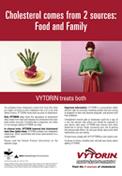Drug ads emphasizing familial health risks prompt at-risk patients to adjust their lifestyles, not just pop a pill, a study found.
Researchers from the University of Georgia’s Department of Speech Communication and the University of Pennsylvania’s Annenberg School for Communication observed the responses of 400 adults to drug ads for clues as to how ads with hereditary risk cues affect patient outlooks on health and what actions they prompted. They wanted to know if ads citing hereditary risk make patients fatalistic or not, and whether they prompt changes in diet and exercise or just medication.
Study participants were shown modified ads for Merck’s Vytorin, for high cholesterol, Warner Chilcott’s Actonel, for osteoporosis, and Bayer aspirin, for heart attacks. Copy was modified for participants in the control segment – the “two sources” of high cholesterol cited in the Vytorin ad’s tagline, for example, were changed from “food and family” to “food and inactivity.”
The upshot? Rather than feeling fatalistic about their chances of developing a disease, participants viewing the unaltered ads were more likely to say that they planned to eat healthier and exercise more.
“In a way, we do not believe we are like our parents in that the respondents felt they can overcome family risks to health issues by both pursuing a healthy lifestyle and investigating the use of advertised medications,” said Dr. Minsun Shim of the University of Georgia. She said that citing “genetic” factors rather than “family” risks is a better bet for promoting drugs, but that familial language cues lifestyle adjustments.
More research is needed into the correlation between willingness to change lifestyle and willingness to seek medical assistance, said Dr. Shim.








